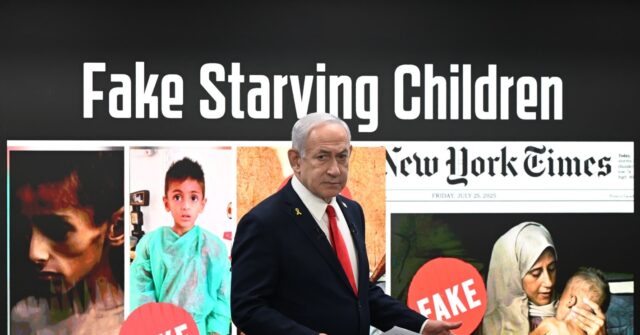Twelve Palestinian children who were presented in the international media as “starving” due to Israel’s war of self-defense against Hamas terrorists in Gaza were in fact suffering from other health conditions.
That’s the conclusion of an investigative report by Olivia Reingold and Tanya Lukyanova of the Free Press, who looked into the background behind the emaciated Palestinian children who featured — all at once — on front pages and homepages throughout the west, from the New York Times to the BBC.
They found that “the viral photos lacked important context: The subjects have cystic fibrosis, rickets, or other serious ailments.”
As Breitbart News noted, one of the more famous photographs, from the Times, turned out to be of a boy who had a muscular disorder. The Times updated its reporting — but not before the photo had a major impact.
(Israel challenged the Times to give similar placement to photos of Israeli hostages suffering actual starvation; the Times declined to do so.)
The Free Press reported:
An investigation by The Free Press reveals that at least a dozen other viral images of starvation in Gaza also lacked important context: The subjects of those photos have significant health problems. Those appeared all over social media, in the reports of leading international aid organizations, and on some of the most prestigious news outlets in the United States, including CNN, NPR, and the Times—without disclosing the complicated medical histories that help explain their stark appearances.
It’s not that there isn’t hunger in Gaza. There is. The World Health Organization reported 63 deaths from malnutrition last month alone, including 25 children. Some of them might have been sick or worse even if there was no war. In 2022, about 50 Gazans under the age of 20 died from malnutrition, according to the Palestinian Ministry of Health.
Yannay Spitzer, an economist at Hebrew University of Jerusalem who has been tracking food prices in Gaza during the past few months, said hunger in Gaza is largely declining since Israel resumed aid deliveries in late May after its nearly 80-day blockade. In mid-July, prices for basic necessities like flour skyrocketed by 4,000 percent, according to his review of data from the Gaza Chamber of Commerce and the World Food Programme.
Separately, Avi Mayer of the new Jerusalem Journal noted another major media scandal: the fact that many “journalists” killed in Gaza, to a chorus of global condemnation, were in fact doing double duty as terrorists.
Mayer wrote:
Throughout this war, though, numerous individuals identified as journalists in Gaza have not only failed to intervene when harm was imminent — they have actively participated in inciting, perpetrating, amplifying, and celebrating that harm.
…
Journalists certainly deserve protection and Israel’s approach to the international media throughout this war — including its ill-considered and continuously detrimental decision not to permit foreign journalists to enter Gaza freely — has been imperfect at best. But by accepting the outlandish notion that terrorists who exploit journalistic cover to engage in hostilities deserve the same protections as actual journalists, these groups betray both their profession and the very individuals they are meant to represent, endangering them and making a mockery of their work. Rather than dismissing or ridiculing honest critiques by media watchdogs, these groups would do well to take evidence of wrongdoing seriously and consider whether the individuals in question are indeed deserving of protection — or of the title “journalist” at all.
Few western media outlets inform their audience of the extent to which photographs, videos, and reports from Gaza are reliant on approval from Hamas — or on the work of actual terrorists, producing propaganda.
Joel B. Pollak is Senior Editor-at-Large at Breitbart News and the host of Breitbart News Sunday on Sirius XM Patriot on Sunday evenings from 7 p.m. to 10 p.m. ET (4 p.m. to 7 p.m. PT). He is the author of The Zionist Conspiracy Wants You, now available on Amazon. He is a winner of the 2018 Robert Novak Journalism Alumni Fellowship. Follow him on Twitter at @joelpollak.
Read the full article here


